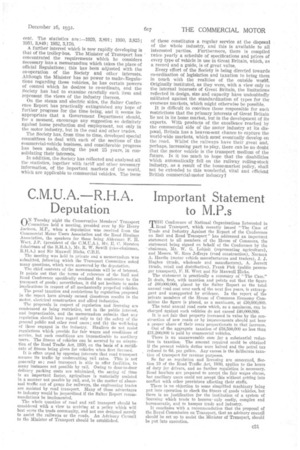C.M.U.A. R.H.A.
Page 77

If you've noticed an error in this article please click here to report it so we can fix it.
Deputation
ON Tuesday night the Conservative Members' Transport Committee held a meeting, presided over by Sir Henry Jackson, M.P., when a deputation was received from the Commercial Motor Users Association and the Road Haulage Association, the speakers for these being Alderman F. H. Wort, J.P. (president of the C.M.I.T.A.), Mr. E. C. Marston .(chairman of the R.H.A.), Mr. R. W. Sewill .(vice-chairman. TULA.) and Sir Maxwell Hicks, C.B.E.
The meeting was held in private and a memorandum was submitted, following which the Transport Committee asked many questions, which were answered by the deputation.
The chief contents of the memorandum will be of interest. It points out that the terms of reference of the Rail and Road Conference specifically confined the conference to the transport of goods; nevertheless, it did not hesitate to make implications in respect of all mechanically propelled vehicles.
The penal taxation and restrictions by regulation proposed in the report have already caused disastrous results in the motor, electrical construction and allied industries. The proposals in respect of regulation and licensing are condemned as being restrictive, not in the public interest, and impracticable, and the memorandum submits that any regulation should have regard only to (a) the safety of the general public and other road users; and (b) the well-being of those engaged in the industry. Hauliers de not resist regulations which provide far fair wages and conditions of service, but such conditions are impracticable to ancillary users. The fitness of vehicles can be secured by an adaptation of the Road Traffic Act, 1930, on the basis of a certificate of fitness being given for vehicles when first lieeused.
It is often urged by opposing interests that road transport secures its traffic by undercutting rail rates. This is not generally so; road transport is able to offer facilities, in many instances not possible by rail. Owing to door-to-door delivery packing costs are minimized, the saving of time is an important factor, agriculture is materially assisted in a manner not pose& by rail, and, in the matter of abnormal traffic out of gauge for railways, the engineering trades are assisted by road transport. Many of these advantages to industry would be jeopardized if the Salter Report recom
mendations be implemented. • The whole question of road and rail transport should be considered with a view to arriving at a policy which will best serve the trade community, and not one designed merely to assist the railways or the roads. An Advisory Council to the Minister of Transport should be established.




























































































































































